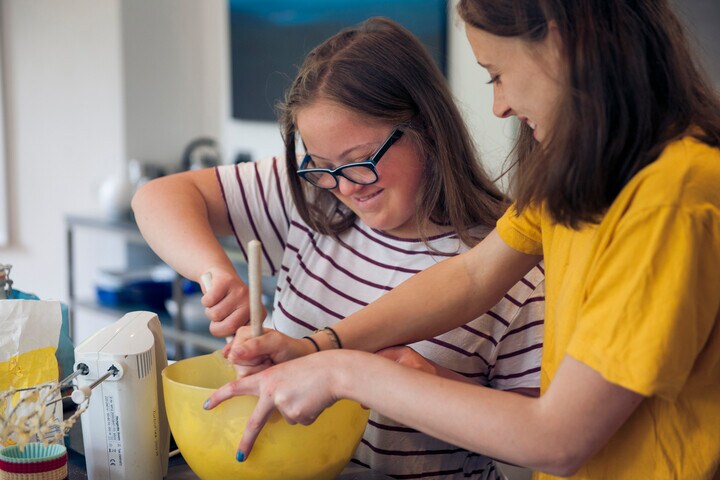Maintaining a Summer Routine for Middle Schoolers
by Cassandra Polzin
byConnections Academy
8 min to readMathematics is a powerful and useful tool in our daily lives. From learning to cook to managing a budget, students will quickly realize that math is essential both inside and outside of the classroom.
With summer approaching, students are prepared to relax and spend time with friends and family. As you plan your family’s time together, it’s important to remember that summer vacation could potentially lead to the “summer slide.” In fact, research has shown that, on average, students lose one month’s worth of what they’ve learned over the course of the school year during summer vacation. As a result, students might feel less prepared when they return to school in the fall.
Fortunately, there are plenty of ways to keep your child’s math skills sharp without it feeling like summer school work! If you want to know how you can support your child’s learning over summer break, here are some fun summer math games and activities.
Young children demonstrate a natural interest in math before they enter school. For example, they notice shapes and patterns, compare quantities, and can learn to count at an early age. Because children are accustomed to learning through their daily habits and routine, hands-on math activities that incorporate familiar territory are an easy way to keep your elementary schoolers’ minds moving.
Research shows that exercise improves students’ school performance. So, apart from the extensive health benefits, it can also boost your child’s summer learning. While online school is out of session, you can encourage your student to take a daily walk. Not only is it great exercise, math is included in every step.
Let’s say you like to start the morning by fetching your mail. Over summer break, you could assign that responsibility to your young learner. Each time they get the mail, have them count how many steps it takes to get from the porch to the mailbox.
During walks, you can also call attention to the cars passing by. You might ask your child to count how many they see driving by as you walk or task them with identifying the quantity of red cars they can spot—and without any effort at all, they’re brushing up on their math skills.
Addition is one of the first math operations students learn, so practicing it on the go should be a breeze. For example, when you visit the grocery store, you likely have a budget in mind. To help your child stay caught up on math, take them along with you and make grocery shopping a learning opportunity. Bring a notepad and try tasking your child with adding up the prices of the grocery items in your cart before checkout. Once you reach the line, your elementary schooler should have an idea of how much you’re about to spend.
When you get to the car, you can compare your receipt to their list to see if they came close to the total. Consider giving them a prize or special treat from the grocery store if they do! This way, they’re actively learning and making everyday activities fun.

For many young students, foundational math concepts like fractions might seem intimidating. However, over the summer, students have ample time to gain a better understanding of math concepts, improve their performance, and enhance their learning.
With the absence of virtual school, you can replace math lessons with designated cooking time. In addition to critical-thinking skills such as following directions, having fun together in the kitchen includes using specific math skills like measuring ratios in a recipe. While cooking or baking, you can ask questions like, “How many portions will this make?” or “How much flour will this recipe need?” Through this activity, students are able to utilize hands-on learning to bring concepts like fractions to life.
As online learners move on to middle school, more complex subjects will be introduced. In elementary school, they were taught the basics—but now geometry and algebra take a front seat. As math becomes more advanced, it is increasingly important to practice—making summer the perfect opportunity to keep math concepts top of mind.
Summer math games that involve cards are a great way to keep your middle schooler engaged. Playing cards can help students think strategically and—you guessed it—improve math! And if you need some game inspiration, take a look at this Math War Game from a Connections Academy teacher.
Connections Academy teachers are specially trained to engage students in the online classroom and use many tools and resources to enhance the online learning experience. Math lessons don’t have to be a bore for your student—check out this exciting math card game from a Connections Academy teacher. Watch the full experiment on the Connections Academy YouTube channel.
To play, all you need is a deck of cards and your Connections Academy student. In Math War, each player turns over two cards to find the sum. The player with the higher sum wins and takes all four cards.
Until all the cards are gone, you and your student repeat this step and the player with the most cards at the end wins. Your student will be having so much fun that they won't even realize they’re practicing math. Plus, for middle schoolers, you can make it even more challenging by modifying it to review complex multiplication.
Percentages are used every day to compare numbers, describe discounts, and justify sales tax. Therefore, learning how to calculate a tip is another great activity you can implement to help your student practice math.
When calculating a tip, students are able to apply their knowledge learned in the virtual classroom to real-world scenarios. For instance, if you go out to lunch with your student and want to leave a 20% tip, allow them to take the lead and determine what the total amount will be. When middle schoolers use math in everyday scenarios such as these, the subject will be easier to grasp in the classroom.
Understanding basic financial skills is important even in middle school. A useful way to practice this is by creating a budget with your child.
Over the summer, if your child receives an allowance for completing daily chores, the money earned is their disposable income. By encouraging them to create a budget, they become responsible for managing their money, and among other concepts, learning how to calculate risks if they overspend. Having a budget also teaches students reasoning so that they’re able to conceptualize complex problems. Finding real-world relevance like budgeting using their own money is a practical activity to keep them interested and connected to math while on summer vacation.
In high school, students are thinking more about their future professions. From architecture and engineering to journalism and marketing, math will be required for any role. To prepare themselves for life after high school, they can take the necessary steps to improve their math skills while on break.
Sports rely on math during every game, so if your high schooler is a sports lover, fantasy football would be an excellent activity for them. During the summer, students can start off by watching pre-season games to follow player trends and performance to determine the advantage of having specific players on their team. Analyzing the pros and cons of selecting a player and keeping track of league standings are just a couple of ways fantasy football can be used as a tool for learning and applying math skills.
When they return to school, they can use the knowledge learned over the summer to keep track of the number of points their team is scoring while they’re watching football or tracking the progress of a game on an app. Using sports as a learning method can help your student develop an interest in math and engage with the topic in a whole new way!

Summer is the best time to earn some extra spending money and, at this age, students can handle added responsibility. You can encourage your teen to start a business by babysitting, doing yard work, or even incorporating personal passions such as fashion design.
Having a small business is a good opportunity for your student to learn about accounting basics such as calculating expenses and managing profits—all of which can help them excel in their math courses the following year and teach them about entrepreneurship.
It’s a well-known fact that teenagers are digital natives. Additionally, students who attend online high school have the advantage of using technology in their daily instruction. So, if you’re looking for something easy and interesting that helps your student practice math, educational apps are probably the way to go! Math apps allow students to learn on their own time and at their fingertips. In addition to math-specific apps, like Desmos, there are a number of other activities you can introduce to encourage your student’s mathematical abilities.
While workbooks and homework can help students to practice math, summer is a great time for them to work on applying their skills using real-world methods. If you enjoyed learning about these math games for summer, check out this summer slide prevention guide and learning game resource list for more ideas!
by Cassandra Polzin
by Connections Academy
by Cassandra Polzin
